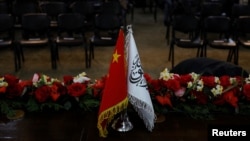Taliban authorities in northeastern Afghanistan said Wednesday that a gun attack resulted in the death of a Chinese national, while his local interpreter escaped unharmed.
An Afghanistan-based Islamic State affiliate, IS-Khorasan, claimed responsibility for the deadly overnight shooting in Takhar province, which sits on the country’s border with Tajikistan. The terrorist outfit said on its Amaq media outlet that its “soldiers” used a machine gun to target the Chinese man.
Taliban officials said the slain foreigner was working for a mining company in the country.
Mohammad Akbar, the provincial police chief, said the Chinese citizen was being driven with his interpreter to the Dasht-e-Qala district late Tuesday when their vehicle was ambushed.
Akbar said that foreign travelers must notify local police before embarking on a road trip, but he said the deceased Chinese citizen failed to do so. The police officer added that an investigation into the attack was underway.
“I believe our embassy in Afghanistan will track the information over what’s happened and do its utmost to protect the lawful rights and interests of Chinese citizens and their safety,” said Mao Ning, a spokesperson for the Chinese Foreign Ministry, during a press conference in Beijing when asked about the shooting incident.
Tuesday’s fatal assault on a Chinese national in Afghanistan marked the first such incident since December 2022, when IS-Khorasan militants stormed a Kabul hotel popular with Chinese investors. That attack resulted in the deaths of three Afghans and injuries to 18 people, including five Chinese nationals.
The Taliban regained control of Afghanistan in August 2021, when the United States and its Western allies withdrew their troops from the country after a nearly two-decade-long presence.
While de facto Afghan rulers assert they have restored peace and order to the conflict-torn country since seizing power, IS-Khorasan has conducted repeated high-profile attacks targeting Taliban leaders, key religious figures and members of the Afghan minority Shiite community.
No country has officially recognized the fundamentalist Taliban as legitimate rulers in Kabul, mainly over their sweeping curbs on Afghan women’s rights and freedoms and other human rights concerns.
China was the first country to appoint an ambassador to Afghanistan and recognized a Taliban ambassador in Beijing since the group took control. It also has enhanced bilateral trade and investment ties with the de facto Kabul government to help stabilize the Afghan economy and deal with a dire humanitarian crisis.
Chinese investors have signed significant agreements with Kabul in the Afghan mining and oil sectors since the Taliban takeover.
Analysts suggest that China’s security concerns are motivating its growing diplomatic and economic engagement with the Taliban to prevent the country from descending into chaos again, which could lead to militants using Afghan territory as a base for launching terrorist attacks against Chinese interests.




